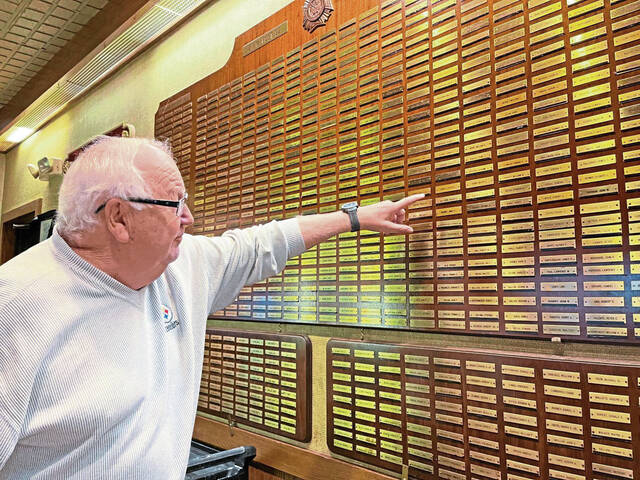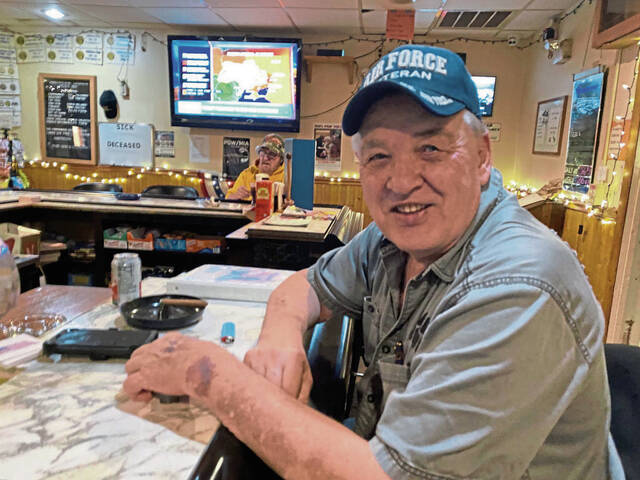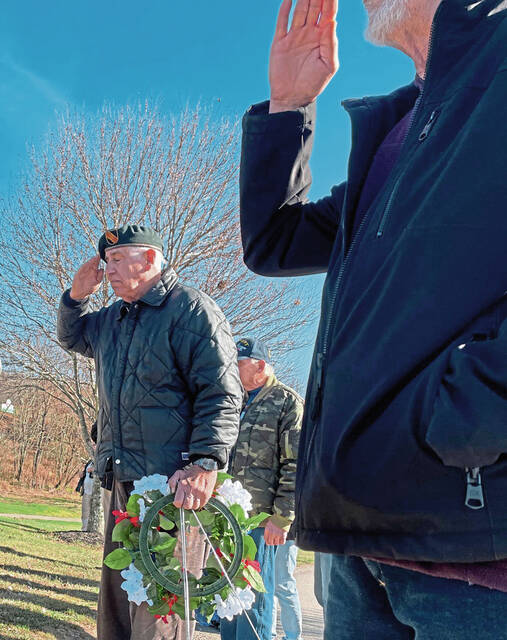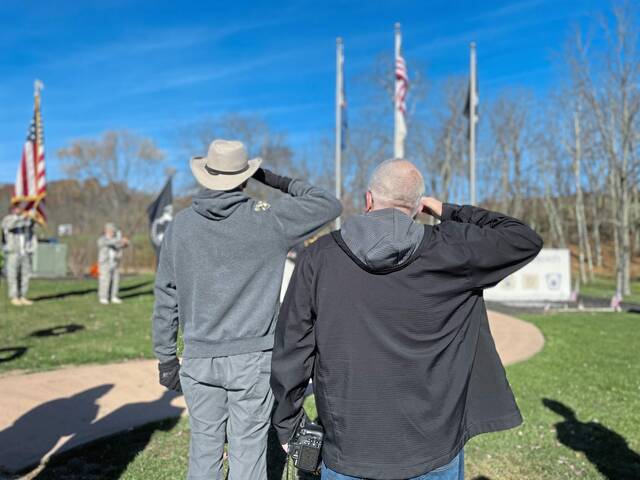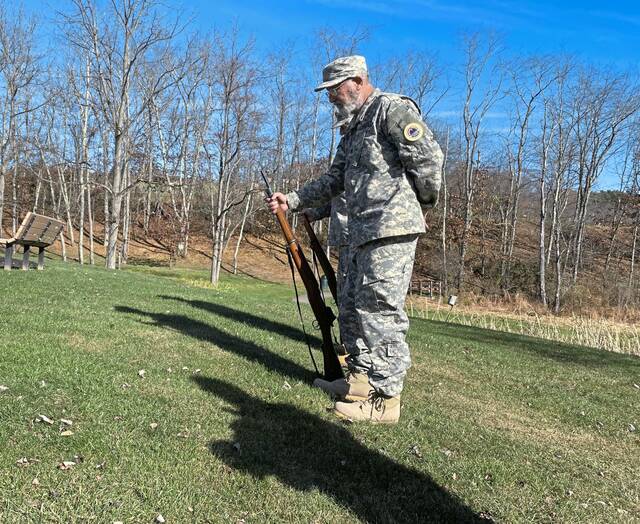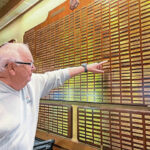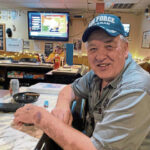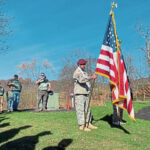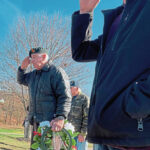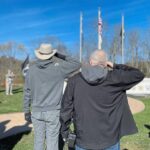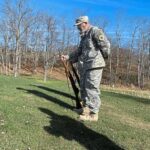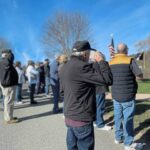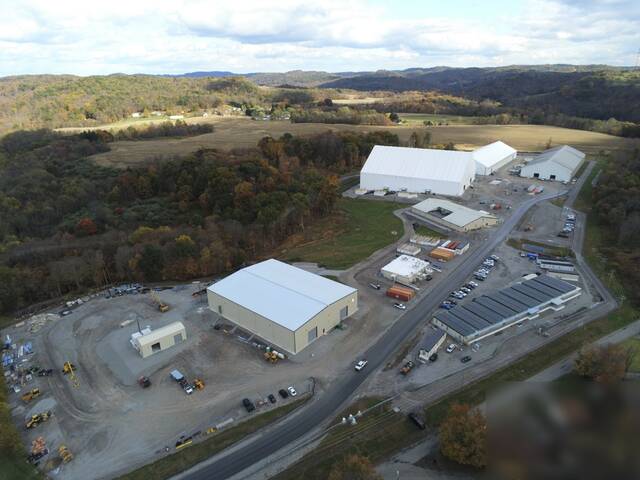U.S. Army Reserve veteran Jim Reesman practically grew up around the American Legion post in Brackenridge.
His grandfather was a sailor, his father a Marine. His grandmother and aunt were bartenders.
Reesman, who lives in Tarentum, enlisted in 2012, did a tour in Iraq in 2017-18, and got out in 2020. He was part of the Sons of the American Legion before becoming a regular member.
“I like the crowd down there,” he said of why he joined. “I see a lot of the benefits the legion offers to veterans. It’s kind of like another home. It’s like a family.”
But at 29 years old, Reesman is an exception, as veterans organizations such as the American Legion, Veterans of Foreign Wars and AmVets all report their ranks are aging and shrinking. They are trying to replenish with younger members but are having difficulty recruiting them from a smaller pool of veterans.
“Most of the younger veterans have a lot of stuff going on. They have work, families and children in school,” said John Getz, adjutant quartermaster and past state commander of the VFW.
Younger veterans are joining, but there aren’t as many of them. Despite that, the organization carries on, advocating for them.
“Everybody thinks that the government just gives them something. If it wasn’t for the VFW, they wouldn’t have anything,” Getz said. “They wouldn’t have benefits. They wouldn’t be able to go to a VA hospital and be taken care of. The government won’t give them to you. You have to go out and you have to fight for that. That’s what the VFW does.”
With fewer dues-paying members, the Legion has less money to support its programs, said James “Woody” Hogan, state adjutant and Army veteran. But it makes do with what it has.
“The organization is 106 years old,” he said. “We’re not going anywhere.”
The Legion has 674 posts in the state, down from more than 800 at one time. Contrary to what may be the popular conception, they are not just a bar on the corner.
“We are there to enrich the lives of veterans in their communities,” Hogan said.
AmVets, short for American Veterans, has a smaller presence in the state with 27 posts. Like the Legion and VFW, it also seeks to support veterans and help them get the benefits they need and earned, even if that means just helping them navigate the processes, said John Thase, a department service officer for AmVets in Pennsylvania and a 20-year Army veteran.
“All of the organizations kind of do the same thing for everybody,” he said. “There are little differences to each of them. We all peacefully co-exist.”
Joshua Gongaware considers the White Valley AmVets a second family
Gongaware, of Salem’s Slickville neighborhood, joined the Delmont veterans organization about four years ago after serving in the Army from 2003 to 2015.
“It’s like having a family — there’s a bond,” he said. “We all know the programs. Everybody can help everybody out.”
The group — which has nearly 200 veteran members — has seen a decline in participation over the past decade, said second Vice President J.P. Clark.
“The younger veterans don’t quite want to get involved yet until they get into their 50s and 60s so to speak,” said Clark, 60, of Delmont. “That would be probably the largest change that most posts see across the country.”
Clark thinks young veterans misunderstand the purpose of AmVets, which deters them from joining.
“A lot of them still think that there’s just a bunch of people sitting around talking old war stories and stuff,” he said, “and that’s really not the case.
Gongaware, 42, is one of the youngest members. The oldest is 101.
“Not a lot of young veterans want to join,” Gongaware said. “I don’t know why. I try to get some of the people I was (in the Army) with to try to join…They’re just not interested.”
But organizations like AmVets still do vital work, Gongaware said.
“American Legion, AmVets, they have resources for veterans like VSO, veterans service officers,” he said. “If you need help with a disability claim, they can point you in the right direction. If you’re having financial hardship, they have programs that can help you.”
Moving to Pennsylvania
AmVets will have a larger presence in Pennsylvania, as it is moving its national headquarters from Washington, D.C., to Washington County. The organization bought a former synagogue in Washington for its offices and an elementary school in South Strabane, which will become its family services center. A ribbon cutting is planned for mid-March, said Joe Chenelly, national executive director and a Marine Corps veteran who was in Afghanistan and Iraq.
The Washington County location keeps the organization within a day’s drive of the nation’s capital while offering a lower cost of living and higher quality of life, Chenelly said.
Needing to attract younger veterans was an issue on Chenelly’s first day with AmVets 19 years ago. When World War II veterans came home, there was nothing for them, and they had to fight for services and benefits that are now automatic, he said.
“A lot of times veterans want to get away from that part of their life and strike out in a different direction,” Chenelly said. “Once they get to their mid-40s and start missing that sense of community and recognize the benefits for them they didn’t feel they needed when they were young and spry, and miss the camaraderie, they come back.”
‘Part of our family’
Lee Johnson, 81, commands the VFW post in Lower Burrell. An Army veteran who served in Vietnam, he remembers when some of the World War II guys there were not welcoming to them, saying Vietnam was not a “war.”
“We started coming. They got over it,” he said.
With 550 to 600 veteran members, Johnson, in his ninth year as commander, says his post is doing well, but only 10% to 15% of them are what he calls younger.
Unlike his generation, Johnson said younger veterans have no reason to worry about how they’d be received.
“We just accept them. Come on in, be part of our family,” he said. “We welcome them with open arms.”
But there haven’t been many to welcome in.
“I can’t get them,” he said. “We’ve tried different programs to invite them in. We can’t corral a lot of the younger ones. We’re going to keep trying.”
Membership at the American Legion post in South Greensburg has remained steady the past few years, said Tom Pastor, 69, an Air Force veteran from Hempfield who also belongs to AmVets in Greensburg.
Many of the members are retired, said Pastor, who served from 1974 to 1979. They’ve found it’s difficult to recruit younger veterans, many of whom don’t want to be around the older vets.
“We don’t understand what to do to get (younger veterans) to come in,” Pastor said. “The younger guys want to go to the casino.”
It’s a misconception, he said, that old veterans sit around swapping war stories.
“Nobody wants to talk about old war stories. Nobody wants to remember that stuff. The past is the past,” Pastor said.
The American Legion post in Brackenridge has almost 400 veteran members, but at one time had more than 1,000, its commander, Frank Svikek, said. He was in the Army from 1982 to 1986, when he joined.
“I just joined to be part of a veterans organization,” he said.
Nobody really has an answer for how to bring in younger vets, he said.
“When you’re in the service, the Army can’t promote the American Legions or VFWs,” he said. “That kind of limits things. When they get out, they don’t know to join.”
Reesman cited that limitation, and said the groups should do more to get their names and information out.
“A lot of people think it’s just an old man’s veterans club. That’s how I thought about it for years. It’s hard to change that image overnight,” he said. “A lot of people my age are still going to downtown Pittsburgh or other bars that’s their clique.”
The American Legion in Mt. Pleasant tries to reach new members with informational booths at events, such as the Glass & Ethnic Festival and the Westmoreland Fair, its commander and Vietnam veteran, Bill Williams, said.
“You might get one new member, or you might be wasting your breath,” he said.
Smoke-free encouraged
Membership in Williams’ post has fallen from about 1,500 to 400 over more than a decade, with their average age between 50 and 60.
“As members pass on, we don’t get anybody to put in their place,” Williams said. “We have a few Korean War veterans, but mainly the Vietnam era is holding up the banner.”
While older members enjoy socializing over beers at the post, where smoking is still allowed, younger veterans have other priorities that may dull their interest in joining.
“It’s just a different scene these days,” Williams said. “They go somewhere where they can be with their families. They don’t want to be around the smoking scene.”
At the VFW, there is a trend of more posts going smoke-free, Getz said.
What veterans need the most from such groups is camaraderie, Reesman said.
“Once you’re used to that atmosphere, when you get out of that atmosphere and into civilian life, it’s a little more difficult,” he said. “Being able to go to the club and hang out with other veterans, it brings the camaraderie back. You feel like you have a place.”
There is a hope among many at the organizations that the nation’s newest veterans may join as they, too, age.
Now in his mid-60s, Roy Hutchinson didn’t get involved with the American Legion until he was about 35. He understands why the younger vets may not be coming.
“Today, it takes both a husband and wife to work to make ends meet,” said Hutchinson, commander of the Legion post in Ligonier who served 18 years in the Army and National Guard.
While his post’s membership has dropped from a high of about 500 to about 350, not charging dues to active service members has helped shore up the ranks. They usually stay on and become dues-paying members.
Still, Hutchinson worries its efforts to help veterans and others in the community could be lost if more younger members can’t be brought in.
“What’s going to happen when places like us close?” he wondered.
Staff writers Joe Napsha, Jeff Himler and Quincey Reese contributed to this report.



